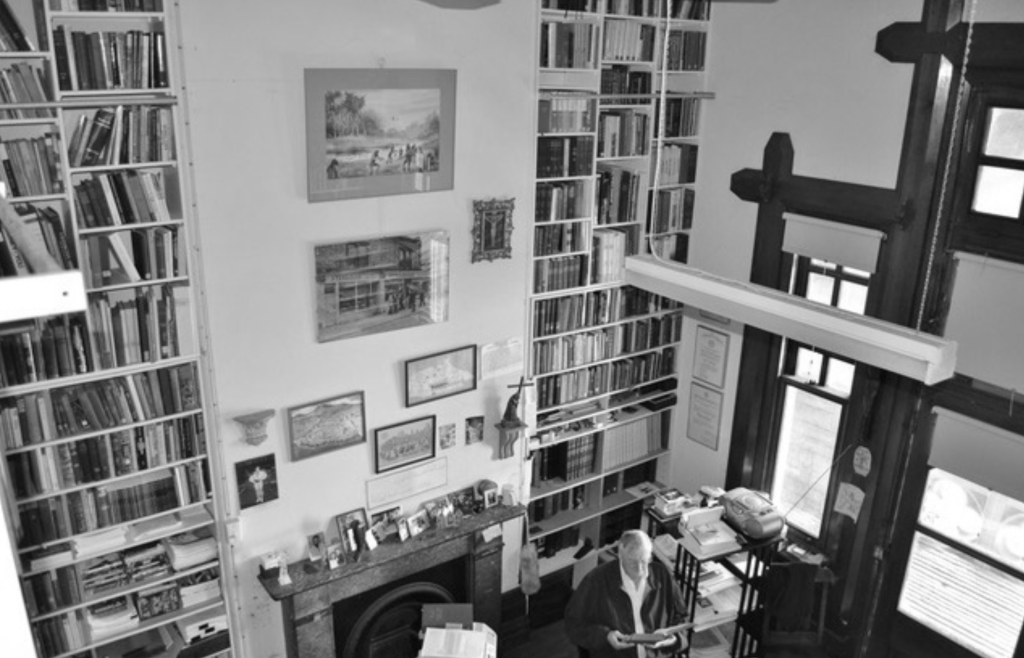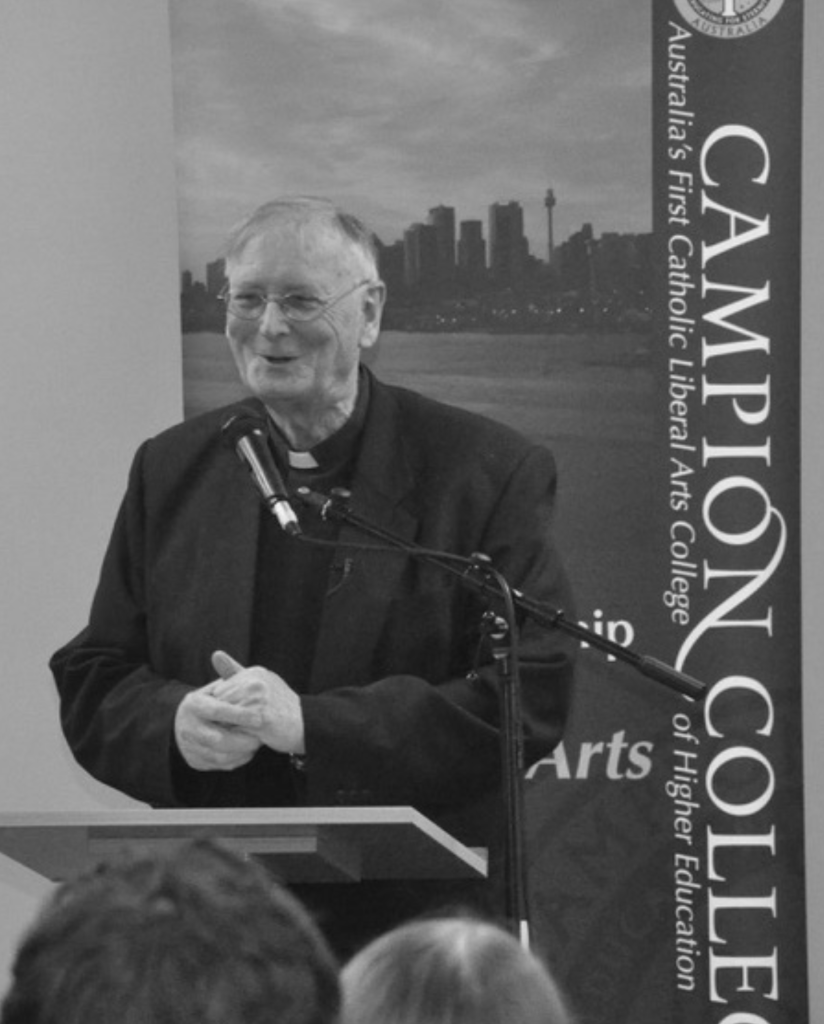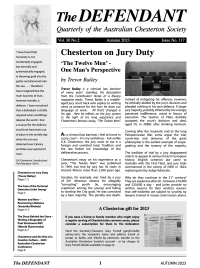Wanda Skowronska is a Catholic psychologist and author of several books, most recently Paul Vitz: Psychological Mythbuster (2022).
As a friend of Fr Paul Stenhouse and a long-time contributor to the journal he edited, Annals Australasia, she was particularly well placed to write an authoritative biography of him, Paul Stenhouse MSC: A Life of Rare Wisdom, Compassion and Inspiration (Connor Court, 2020).
Here she recalls various memories that helped to inform and inspire her book.
Paul Stenhouse (1935-2019), priest, writer, publisher, editor, and scholar, was a friend to many. I met him sometime in the 1990s, after a Mass at the church of Our Lady of the Sacred Heart in Randwick.
Wondering if he really could speak ‘all those languages’, I asked if he could say something in Aramaic. He graciously said the Lord’s prayer in Aramaic, as cars whizzed by.
Mind you, I did not know how well he could also speak Aramaic, Latin, Greek, Hebrew, Arabic, Syriac, Samaritan and Ugaritic! Nor did I know – but I was to learn – that the title of his PhD was: “A Critical Edition of the Kitab al-Tarikh of Abu’l-Fath.” (Abu’l-Fath was a Samaritan priest and the Kitab al-Tarikh was a work he had written).
Nor did I know that Fr Stenhouse was a member of the Société d’Études Samaritaines within the Collège de France (a prestigious research establishment founded in 1530). Nor that he gave papers in Paris, Tel Aviv, Jerusalem, Oxford, Budapest, Zurich and Helsinkik.

Most of all, never, ever, did I imagine I would write his biography.
At school I had read Annals which had a growing circulation in the 1970s at times reaching 70,000 a month. Fr Stenhouse took over its full editorship in 1966 and provided a counterbalance to the cultural upheaval of the times. It was around 2004, in a chance meeting that a priest suggested to Fr Stenhouse, that I write ‘something’. And just like that, I was co-opted into those writing for Annals, the longest lasting publication in Australian history, outlasting even the Bulletin!
I was invited to write about psychological disorders, stresses of our times, and new emphases on well-being, and did so for over 15 years, generating some lively discussion.
Anchoring the memories
When Fr Stenhouse died on Nov 19, 2019, we were all shell-shocked. We stood outside Our Lady of the Rosary church in Kensington, exchanging wonderful stories of this extraordinary priest’s travel, and wit. There was an inchoate desire to anchor these memories.
Someone asked me if I would write something, and then a publisher wrote to me. I was shocked – how could I ever contemplate such a thing? But as the days passed, the idea took hold and Peter Macinante, the Annals Office manager, said he would help me with materials. Still in shock, Provincial Fr Chris McPhee graciously gave access to Fr Stenhouse’s old office where photos, books, and articles remained.
My interesting journey began to unfold – reading, interviewing friends and family, searching archives, collating information. This was ‘pre-Covid’ in December 2019. How fortunate I was to start at that time and to have some interviews with Fr Stenhouse’s friends before the world went crazy.
I met Fr Stenhouse’s brother Richard Stenhouse, hearing of childhood days in Camden, after their father died in Casino, where Fr Stenhouse was born in 1935. Richard spoke of his brother leaving school early to work in journalism in the era of machinists and linotypists. Young Paul worked on the Camden News, Campbelltown News, the Picton Post, and the Warragamba Times. Then, on seeing an Annals ad, came the decision to enter the minor seminary at Douglas Park and brother Richard drove him there in his own car.
I was starting to piece together some of his early life, his Juniorate years, and subsequent ordination in St Mary’s Cathedral on July 20, 1963.
One day, I found myself tiptoeing along an unlit corridor, together with James Franklin, Professor of Maths and historian, and Peter Macinante – to Fr Stenhouse’s “old office” in the MSC monastery in Kensington. It was like a scene out of an Indiana Jones movie, approaching a mysterious cavern where anything might happen. Peter opened the large wooden door, and we all entered the semi-darkness with great curiosity.
Suddenly, when the light was switched on, there was a real “wow” factor, our eyes went everywhere, seeing books from the ceiling to the floor, a whole bookshelf of cameras, files of photos, papers on the desk, religious books, and Biblical quotations on the wall in several languages! There was an overwhelming sense of Fr Stenhouse’s presence. It seemed he had stepped out for a coffee and would re-enter at any moment!
For me, the task was initially overwhelming.
I started taking photos of papers, arranging for copies of interesting materials, a travelogue in his handwriting, photos of cardinals, bishops, priests, sisters, missionaries, families, and political leaders in folders spanning decades. Also, a filing cabinet with air tickets – and that in itself told a story! For example, one set revealed an itinerary to Moscow, Ekaterinburg, Novo Tichinski Convent; then to Prison Camp 349/12, monasteries in the Ural Mountains, and Celjabinsk, Niznij Tagil, and Simferopol.
Networks of friends
Fr Stenhouse was friends with Ukrainians, Indonesians, Poles, Armenians, Lebanese, Syrians, Malaysians, Italians, Chinese and Vietnamese among others.
He forged a strong friendship with businessman Josef Assaf who migrated to Australia from Lebanon in 1967. Joseph told me how he had invited Fr Stenhouse to his home in Sydney and to Hardine, in northern Lebanon, where Maronite Saint Nimatullah had lived. The intrepid Fr Stenhouse visited monasteries, avoided snipers, and in 1993, met with the exiled Prime Minister of Lebanon, now in France – Michel Aoun – a veritable coup for Annals!
Travelling to Ukraine in 1991 with Australian Director of Aid to the Church in Need, Phillip Collignon, Fr Stenhouse was immensely moved by the return of Myroslav Ivan Lubachivskyj, Great Archbishop of Lviv, Metropolitan of Galicia, after the fall of the Soviet Union. Phillip told me of Fr Stenhouse’s excitement as he jumped on top of media vans to get good shots, how he talked to Ukrainians, journalists, Communists. They were days of great hope.

Chai Changning, who had played flute in the movie Mao’s Last Dancer, recounted how he “accidentally” met Fr Stenhouse after the flautist had played at a wedding in Randwick and of the seminal role Fr Stenhouse played in his conversion. With photographer Jacob Mafarian, Fr Stenhouse also went to Armenia in the 1990s, surviving a hair-raising Aeroflot flight from Paris to Yerevan, with one passenger continually drinking vodka to steady his nerves.
Former students said he was “father” to them. One of them, Julian Leow, became the Archbishop of Kuala Lumpur, inviting Fr Stenhouse there many times. Another Malaysian friend, Chris Lim, recalled “the day he escaped from hospital to be with us”. The Sydney Malaysian community planned an 80th birthday party for him at Ventnor in Randwick. Though in hospital, Fr Stenhouse did not feel very sick, so he signed himself out and joined his friends.
While John Henry Newman wrote The Idea of a University, Karl Schmude, librarian, writer transformed the ‘idea’ to ‘reality’, enlisting his friend Fr Stenhouse’s help in establishing Campion College, a tertiary college preserving the literary, historical, and spiritual heritage of the west.
Chesterton observed: “Education is simply the soul of a society as it passes from one generation to another” (The Observer, July 6, 1924), and Fr Stenhouse transmitted the soul of Christendom in a most inhospitable age. His method was not only informative but pedagogical, showing us how to do likewise.
How fortunate, that we can access Annals Archive online and the Annals resources on the site of the Journal of Australian Catholic Historical Society, thanks to Professor James Franklin. There are several thesis topics and books buried in those archives!
Fr Stenhouse’s legacy was and always will be a never-ending story.
